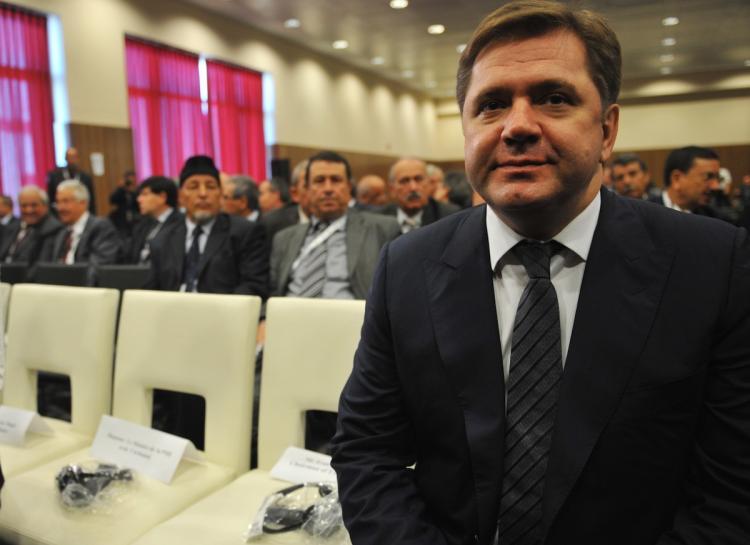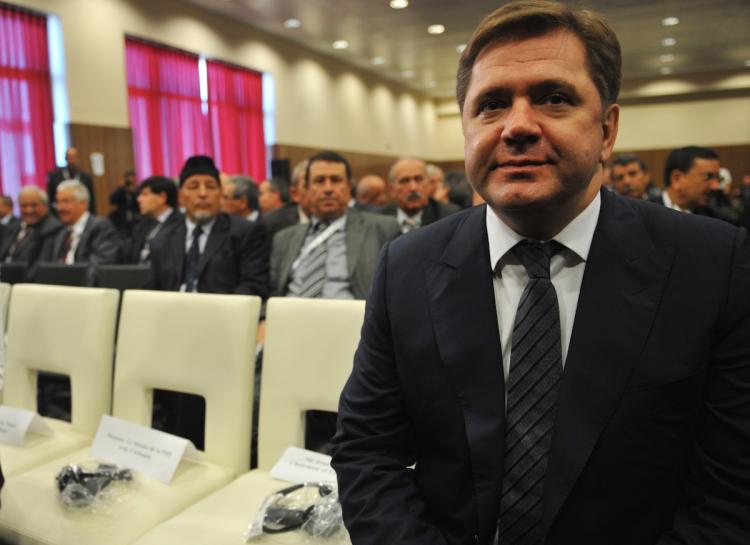The European Union is set to adopt tighter sanctions on Iran targeting investment in the country’s oil and gas industries.
Excerpts from a draft declaration was reportedly circulating before EU foreign ministers said that the trade block would impose “comprehensive and robust” sanctions on the Islamic Republic.
The measures will follow tough U.S. sanctions restricting the import of oil and gas products into Iran.
Both sets of measures go beyond the limited sanctions approved on June 9 by the United Nations Security Council, which mostly targets investments connected to the Iranian military.
The sanctions still have to be approved on Thursday by EU ambassadors in Brussels, but significant changes are unlikely.
However Russia, which approved the U.N. sanctions, poses a threat to the unilateral EU and U.S. sanctions.
On July 14, the Russian Energy Minister Sergei Shmatko said that Russian companies were willing to supply oil and gas products to Iran.
“Sanctions cannot hinder us,” Shmatko was quoted by Russian news agencies as saying.
“Russian companies are prepared to deliver oil products to Iran. The possibility of delivering oil products to Iran exists, if there is a commercial interest,” he added.
Shmatko was quoted after a meeting in Moscow with Iranian oil minister Massoud Mir-Kazemi, where the two officials discussed a “roadmap” of future oil and gas cooperation between the two countries.
The announcement comes after a difficult period in relations between Tehran and Moscow, following Russian President Dmitry Medvedev’s warning that Iran was nearing its potential in building an atomic bomb.
Iranian Foreign Minister Manouchehr Mottaki angrily rejected the remarks as “totally false.”
Russian firms have rich pickings of Iranian gas field projects to invest in following the withdrawal of several western companies. Shell, BP, and Total have already terminated sales of oil and gas products to Iran, after U.S. sanctions.
The measures signed into law by President Barack Obama, effectively close the U.S. market to companies that supply oil and gas to Iran.
Due to a shortage of refineries, Iran only consumes a fraction of the oil and gas it produces itself. Iran’s gas requirements are around 100,000 barrels per day or 5.28 million gallons daily, according to Russia’s energy ministry.
The EU sanctions will also target trade, banking, and insurance, as well as transportation including shipping, and air cargo, Deutsche Presse-Agentur reported.
The draft, urges Tehran to “seize the opportunity to allay the concerns of the international community about its nuclear program.”
It also calls on Iran to take part in talks with EU High Representative Catherine Ashton and the six EU countries involved in nuclear negotiations.
On Tuesday, Iran passed a bill authorizing retaliatory measures against countries that inspect Iranian vessels.
The U.N. sanctions call on all countries to cooperate in cargo inspections if there are “reasonable grounds.”
Russia has also been pursuing the expansive South Stream gas pipeline project to transport Russian natural gas through the Black Sea to Bulgaria, Greece, Italy, Serbia, Hungary, Romania, Croatia, Slovenia, and Austria.
South Stream is seen as the rival project to the EU and U.S.-backed Nabucco pipeline that is being pursued to lesson Europe’s dependence on Russian gas. Nabucco will connect the Caspian region, Middle East, and Egypt—to European consumer markets.
Excerpts from a draft declaration was reportedly circulating before EU foreign ministers said that the trade block would impose “comprehensive and robust” sanctions on the Islamic Republic.
The measures will follow tough U.S. sanctions restricting the import of oil and gas products into Iran.
Both sets of measures go beyond the limited sanctions approved on June 9 by the United Nations Security Council, which mostly targets investments connected to the Iranian military.
The sanctions still have to be approved on Thursday by EU ambassadors in Brussels, but significant changes are unlikely.
However Russia, which approved the U.N. sanctions, poses a threat to the unilateral EU and U.S. sanctions.
On July 14, the Russian Energy Minister Sergei Shmatko said that Russian companies were willing to supply oil and gas products to Iran.
“Sanctions cannot hinder us,” Shmatko was quoted by Russian news agencies as saying.
“Russian companies are prepared to deliver oil products to Iran. The possibility of delivering oil products to Iran exists, if there is a commercial interest,” he added.
Shmatko was quoted after a meeting in Moscow with Iranian oil minister Massoud Mir-Kazemi, where the two officials discussed a “roadmap” of future oil and gas cooperation between the two countries.
The announcement comes after a difficult period in relations between Tehran and Moscow, following Russian President Dmitry Medvedev’s warning that Iran was nearing its potential in building an atomic bomb.
Iranian Foreign Minister Manouchehr Mottaki angrily rejected the remarks as “totally false.”
Russian firms have rich pickings of Iranian gas field projects to invest in following the withdrawal of several western companies. Shell, BP, and Total have already terminated sales of oil and gas products to Iran, after U.S. sanctions.
The measures signed into law by President Barack Obama, effectively close the U.S. market to companies that supply oil and gas to Iran.
Due to a shortage of refineries, Iran only consumes a fraction of the oil and gas it produces itself. Iran’s gas requirements are around 100,000 barrels per day or 5.28 million gallons daily, according to Russia’s energy ministry.
The EU sanctions will also target trade, banking, and insurance, as well as transportation including shipping, and air cargo, Deutsche Presse-Agentur reported.
The draft, urges Tehran to “seize the opportunity to allay the concerns of the international community about its nuclear program.”
It also calls on Iran to take part in talks with EU High Representative Catherine Ashton and the six EU countries involved in nuclear negotiations.
On Tuesday, Iran passed a bill authorizing retaliatory measures against countries that inspect Iranian vessels.
The U.N. sanctions call on all countries to cooperate in cargo inspections if there are “reasonable grounds.”
Russia has also been pursuing the expansive South Stream gas pipeline project to transport Russian natural gas through the Black Sea to Bulgaria, Greece, Italy, Serbia, Hungary, Romania, Croatia, Slovenia, and Austria.
South Stream is seen as the rival project to the EU and U.S.-backed Nabucco pipeline that is being pursued to lesson Europe’s dependence on Russian gas. Nabucco will connect the Caspian region, Middle East, and Egypt—to European consumer markets.






